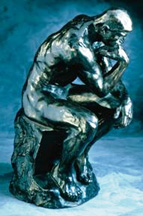
Nothing brings out law student stress more than exam time (except, the big one, the Bar Exam). OOTJ already discussed the link between stress and depression, with some links for help, here,
and here. And we hosted one posting on exam stress last year. Here is another list of hints on managing exam time stress for law students.
* Do not link your sense of self-worth to grades in law school. Law School grades merely measure how well this professor believes you learned this course's material, and how well you read and analyze the facts given.
* Maintain your balance! Take care of your body and your mental state -- skip the heavy doses of caffeine and totally avoid drugs and alcohol as props. Exercise, meditate or pray. Talk to folks who are not part of law school. Law school is just one part of your life -- it's time-consuming, but don't let it eat you up!
* Manage your thoughts and attitudes. When you begin telling yourself, "I must..." or "I need to..." -- stop! Look below for Irrational Thoughts and Rational Thinking from University of Florida brochure for students. The way you talk to yourself and others about your goals and values has a powerful effect, draining your energy or boosting it.
* Manage your time (it may be too late for early outlining, but you can still schedule your study time -- pace yourself).
* Do not agonize about exams you have finished. It will do no good to participate in the Post Mortem, and may actually interfere with your preparation for upcoming exams. Let it go!
"Maiming the Cubs," by James J. White, excerpted from a fuller article at 32 Oh. N. Law Rev. 287, experienced law teacher's perspectives on the link between law school and stress. link. Memorably disputes notion that law school stress permanently scars students, but recognizes that stress, which often leads to depression, is definitely caused by the rigors of law school. Among other trenchant observations:
Many of our students came from undergraduate disciplines where they earned certain and predictable rewards for hard study and diligent recollection. ... In many law school classes, students must distill general principles from the cases themselves and must show some analytical ability on the examination. When one's practiced modes of learning no longer work, stress and anxiety are inevitable. ... Not all law students will be as academically successful in law school as they were when they were undergraduates. (quoting Prof. Susan Daicoff) "In law school, is students equate self-worth with achievement, to the extent that self-esteem depends entirely on continual successes, a less-than-average academic performance equates with personal worthlessness. The law school experience itself frustrates individuals' need for achievement, since formerly top students in college may not be only average students in law school. Due to law students' demonstrated high needs for achievement, success, and dominance, this phenomenon may have devastating effects on their self-esteem and self-worth."
Prof. Barbara Glesner-Fines at UMKC Law School link adds:
... there is always more you can do. In law school, as in legal practice, there is always one more possible way to view a problem; one more possible source of authority or enlightenment; one more possible solution; one more possible way of communicating your ideas.
In addition, for most of this work you are on your own. In any educational setting, you are responsible for your own learning. However, in law school, one of the primary skills you should be learning is how to exercise that responsibility. How to learn actively and independently. At first, you may feel like there is a secret you haven't been told and you will be searching for answers.
Yet this, too, is one of the differences about legal education. In undergraduate education, you could usually come to class reasonably familiar with the assignment and leave class with greater clarity and certainty about the materials. That won't happen in law school as often. Rather, you will sometimes come to class believing that you understand and have mastered the materials and leave class feeling as though you really don't understand at all. Why is that so? Because law school is designed to develop your critical thinking skill. That skill requires that you be able to generate as many questions as answers. And that uncertainty, that sense of suspended learning, can be extremely stressful.
By the way, I can help with some of that stress. You will often find yourself, in the first weeks of the semester, asking yourself, or each other "But what's the answer?" I'll tell you the answer right now. The answer is "IT DEPENDS." It depends on the facts, the politics and the cultural context, it depends on which jurisdiction, it depends on which time, it depends on which decision maker, IT DEPENDS....
There is a another sense in which legal education can be stressful. Even if there were clear answers to most legal questions, you will be receiving less specific, evaluative feedback than in undergraduate education. Most faculty in the first year give mid-term exams, but few (outside of perhaps your legal writing instructors) provide the type of weekly, graded homework that you might have received in undergraduate education.
Instead, your entire grade for most classes is based on a final comprehensive exam. And those grades count for so much -- becoming a source of considerable stress as you engage in a more competitive, explicit ranking process than many of you have faced since junior high. Think about it -- you are all at the top of your class, you are all highly talented and intelligent people, you are all outstanding students -- but you can't all graduate with a 4.00 grade point average. (You can all graduate, but 90% of you will not graduate in the top 10% of the class).
... Finally, there are all the personal sources of stress that are made worse by law school.
Few of us has enough time. Law school takes all the time you have and then some.
Few of us has enough money. Law school is enormously expensive -- for most of you, the debt you will take out of law school will be the equivalent of a mortgage on your first home.
Few of us are in the kind of physical shape that we would like to be -- imagine the results of a diet consisting heavily of coffees, donuts and Wednesday pizza, and a workout program that consists entirely of carrying 100 pounds of law books from locker to library. (it isn't pretty)
Few of us are crystal clear about why we came to law school -- that question looms even larger when you are sitting up at midnight reading a totally incomprehensible piece of legal writing from the late 19th century.
University of Florida, Maintaining the Balance: A Self-Help Guide for Students link
Irrational Thinking
* Jumping to Conclusions is making a negative assumption even though there are no clear facts supporting the conclusion ("He canceled our date, he must not like me anymore").
* Personalizing is assuming external events are automatically being caused by or directed at yourself when in fact they are not ("She's yawning a lot, she must think I'm boring").
* Selective Attention is ignoring accomplishments and positive experiences and focusing only on negative events and perceived failures. This colors your perception of all future experiences as you selectively look for only negative results and reactions.
* Catastrophizing is exaggerating the significance of an unpleasant event or events ("I got a 'D' on my first exam. I'm so stupid. I'm going to fail chemistry and then I'll never get into medical school").
* Predicting Doom is deciding that failure is imminent before the task is even begun ("I'll never find another girlfriend. I'll never pass calculus").
* Shoulds and Musts are punitive self-statements. They are based on the faulty belief that you are inherently bad or worthless. Therefore, the only way to motivate yourself or succeed in life is to beat and whip yourself into shape. You do this by placing unrealistic demands on yourself ("I must never disagree with him or he won't like me. I must be liked by everyone I know in order to feel like a worthwhile person. I should never make mistakes. I should never cry").
* Dualistic Thinking is perceiving situations and people, including yourself, as either all good or all bad with no room in between. If your performance is less than perfect, you feel you must be a failure.
* Labeling is taking one or two instances of your own or other's behavior and over-generalizing by attaching an exaggerated label ("I'm a loser... she's a liar").
If you use these distorted thinking strategies, you will inevitably feel angry, anxious, depressed and overwhelmed. Just as we have learned to think in stress-producing ways, we can also learn to think more rationally and calmly. Once you have identified your distorted thought patterns, you can start to replace them with more logical thinking, and feel more in control!
Using rational thinking and positive self-statements to deal with external stress will help you feel more in control of your emotions, more positive about yourself, and better able to handle situations. You may still feel disappointed, but you won't feel devastated; annoyed but not enraged; nervous but not incapacitated with anxiety. You may or may not be able to change the external situation, but you can always change how much it affects you by regaining your perspective.
Let's look at some rational thinking alternatives...
Rational Thinking
* Focus on the Present (don't jump to conclusions) "He canceled our date, but he said he'd call tomorrow so there is no reason to think anything is wrong. I'll use the free time to relax with that book I just bought."
* Stay With the Facts (Beware of catastrophizing) "I got a D on my first exam but it doesn't mean I'll fail chemistry. I didn't understand what the professor wanted. I think I'll meet with her so I'll know what to expect on the next exam."
* Be Realistic and Objective (Avoid personalizing) "He's yawning, he's probably tired. It doesn't have to mean that he doesn't like me."
* Be Optimistic (Try not to predict doom) "I'm lonely now... because she's gone. It's natural to feel this way. And even though I may never find anyone quite like her, I'll find someone new and different when I'm ready."
* Be kind to yourself (Don't "Should" yourself) "It's OK for me to disagree with him, it doesn't mean he won't like me. My opinions are valid."
* Retain your perspective (Watch out for negative labels) "I may not have won this time, but that doesn't mean I'm a 'loser.'"
You have the right to make mistakes and to express your feelings. Making mistakes is all part of being human.
Jurist on Exam Taking link. Lots of practical hints from a dozen law profs at various schools.
Barger on Legal Writing; One-L Help link Helpful hints from Prof. Colleen Barger at UALR Law School.
Check Law Student Stress link
Law School Pressure at Top Law Student link
The image of an exploding head is from the Frontier Centre for Public Policy link, a Canadian think tank.














